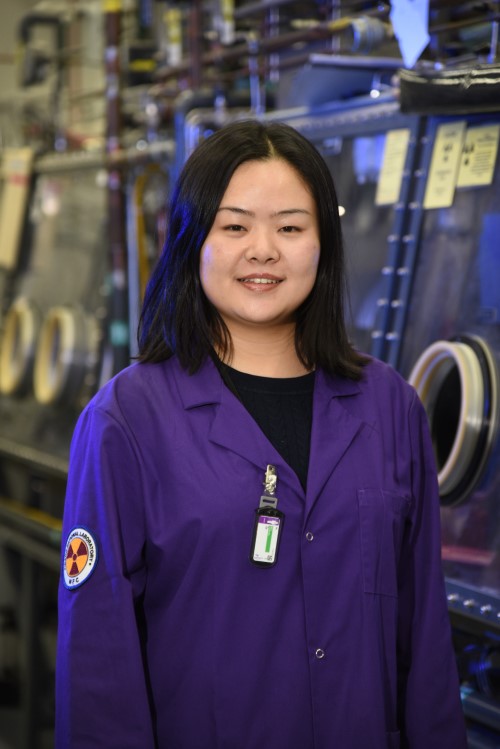By Erica Curless
Dr. Yi Xie is the inaugural Glenn T. Seaborg Distinguished Postdoctoral Associate at Idaho National Laboratory (INL). Since starting her two-year appointment in August, Xie has conducted research at the Materials and Fuels Complex (MFC) using her background in the development and design of metallic fuels.
Xie's research focuses on designing and fabricating advanced metallic fuels that eliminate the problem of fuel cladding chemical interaction (FCCI), which causes cladding failures that can jeopardize the safety of reactors.
Cladding is the first safety shell for fuel inside a nuclear reactor. Xie said during burnup, which is fission in a reactor, lanthanides are produced as fission products. They can migrate to the fuel surface and diffuse with cladding, which results in the breach where fuel can leak into the coolants. She is developing advanced U-Zr and U-Pu-Zr metallic fuels that mitigate the lanthanide-induced FCCI problem when operating in the reactor, improving safety.
"The research helps to reduce risks of incidents, and thus make the reactor more reliable," Xie said.

Xie's work with lanthanides fits the mission with the Glenn T. Seaborg Institute (GTSI) because its namesake co-discovered multiple elements, including plutonium, and committed his life's work to the advancement of actinide chemistry. Seaborg's research on lanthanides and actinides (also known as f-block elements) has had a huge impact on modern society. The mission of the GTSI at INL, launched in 2018, is to nurture talented researchers who have specific interest in actinide chemistry as it relates to basic science, the nuclear fuel cycle, reactor operation and engineering, waste minimization and treatment, and other technical fields.
Xie also is the principal investigator for another project sponsored by INL's Laboratory-directed Research and Development (LDRD) program. The goal is to both improve the understanding of the retention capability of fission products in liquid sodium and to investigate the corrosion effects on structural materials inside a reactor, she said.
This research is to help ensure the public and environment are protected from the potential release of radionuclides during normal and abnormal operations of reactors. With redundant safety systems present in a reactor, a radionuclide release is unlikely, but investigation is still needed to understand the consequences of a release, where the radionuclides go and how they react, Xie said. This research will help to solve the issues and gaps between limited mechanistic investigations of fission products release and the needs of an assessment.
"Both projects ultimately improve reactor safety," Xie said.
Since starting in August, Xie has published four papers on her research and is working on more publications for later this year.
Xie, a native of southern China and a legal permanent resident of the United States, earned her doctorate in nuclear engineering at the Ohio State University and a bachelor's degree in nuclear engineering at University of Science and Technology of China. Prior to joining INL, she worked as a postdoctoral researcher at Virginia Polytechnic Institute and State University.
Nuclear science piqued her interest as an undergrad when she attended many lectures and seminars before choosing nuclear engineering as her career path. Xie wanted to study in the United States to continue the advancement of nuclear science.
This highly competitive postdoctoral appointment provides Xie with a structured environment centered on specific research topics while allowing flexibility to further her interests. The full support of the national laboratory, along with energetic and talented colleagues, offer an excellent opportunity for development of a rewarding career in this field.
"This is a very good opportunity," Xie said. Working at a national laboratory is important because of the collaboration with the other researchers at the MFC, she said, especially mentor Dr. Michael Benson, a research scientist in Fuel and Experimental Assembly and Development. The distinguished postdoctoral appointment is a big bonus for early career research scientists.


